Northern Ireland - For Workers' Unity
A reply to the Workers' Association Pamphlet "What's wrong with Ulster Trade Unionism"
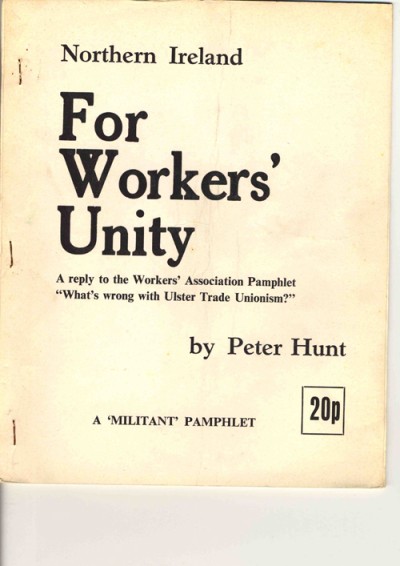
| Date: | 1974 |
|---|---|
| Organisation: | Militant |
| Author: | Peter Hunt |
Contributor:
Info | Peter Taaffe |
| View: | View Document |
| Discuss: | Comments on this document |
| Subjects: | British and Irish Communist Party |
Please note: The Irish Left Archive is provided as a non-commercial historical resource, open to all, and has reproduced this document as an accessible digital reference. Copyright remains with its original authors. If used on other sites, we would appreciate a link back and reference to The Irish Left Archive, in addition to the original creators. For re-publication, commercial, or other uses, please contact the original owners. If documents provided to The Irish Left Archive have been created for or added to other online archives, please inform us so sources can be credited.
Commentary From The Cedar Lounge Revolution
13th December 2010
This document, written by Peter Hadden of Militant, is a fascinating reply to a Workers’ Association Pamphlet. As it notes, in the original WA leaflet there was a proposal to establish an Ulster Trade Union Congress ‘seperate from the ICTU and the British TUC.
It states:
This pamphlet is a reply to one such group [proposing a UTUC]…
It also notes…
The WA have an identical position to that of another group, the British and Irish Communist Organisation. No differences appear betwen the material of these groups. Therefore this pamphlet treats them as identical. One section deals with the broader ideas of these tendencies and the implications of these idea.
It continues:
… This work is not intended merely as an answer to the B&ICO and WA. Sectarianism in NI Has had a shattering effect on the Labour Movement. The Ulster TUC proposal can only serve to worsen this effect. However, just to discard this idea is not enough. It is necessary to work out the ways and means by which flash can be once again put on the Northern Irish TU movement. In rejecting the totally false theories and proposals of the WA, this pamphlet seeks also to provide a positive alternative - a set of class ideas and demands around which the might of Organsed Labour could be brought to the fore.
One aspect that is very interesting is how hostile Militant is to B&ICO/WA.
It argues that:
The aim of the [WA] pamphlet is not to improve the structure of the trade unions in NI, as has been suggested by some, but is to smear the leadership of the TU Movement as ‘republican’ and thereby help discredit them.
It continues:
Many of the pamphlet’s arguments are hair raising indeed! The leaders of the NIC are tried and convicted of the above ‘offence’ on ‘grounds’ which only serve to expose the lack of any class understanding on the part of the Workers Association. The NIC committed such ‘republican’ crimes as refusing to participate in the jubilee celebrations to mark the fifty years of the Northern Ireland state. After fifty years of unemployment and low wages for many of their members what were the trade unions supposed to celebrate? But this action was a symptom of a much more heinous crime! The NIC actually back the demand for civil rights in NI!
And it goes on to say…
Civil Rights, according to the WA was ‘promoted by the republican movement with the objective of weakening internal and international support for the NI Admistration prior to its overthrow’ (P.4). Why socialists should support and defend the rotten tory state and administration in NI we are not told.
Consider the following:
From the erudite thinkers who penned this pamphlet we learn little new about N.I. History. More accurately we find re-invoked the lies and myths about the nature of the N.I. State which for too long the Unionist hierarchy were able to spread. The Civil Rights movement slashed through the web of unionist mythology with facts. Now we find the spider of B&IC and the WA busily at work with its theoretical needle attempting to repair the damage.
There’s far too much material of considerable interest to do justice in a brief introduction such as this. Fortunately the document is highly readable and well worth the effort.
Here are some Workers Association leaflets already in the Archive. The analysis in the Militant document provides a fascinating overview of its own position in regard to Northern Ireland at this point in time. It also perhaps explains later perceptions of B&ICO.
By the way, I can’t recall who, if anyone, sent this to the Archive. Drop me a line and I’ll credit you.
There’s also a text version of this available here , but perhaps the printed version of a document gives a better sense of both itself and the time.
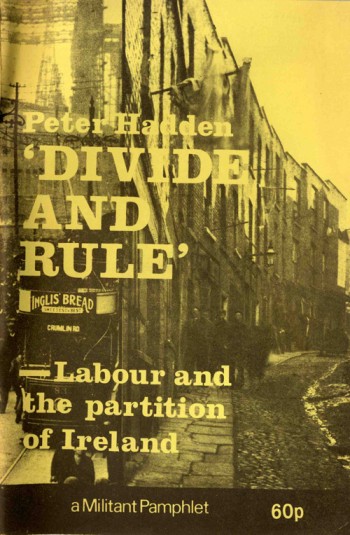
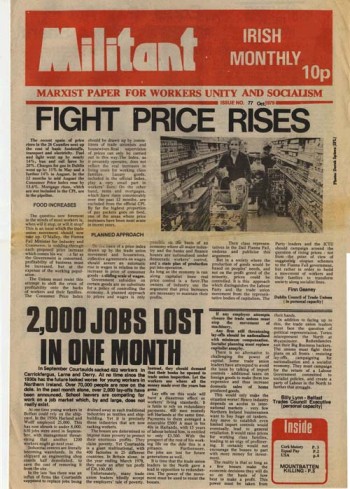
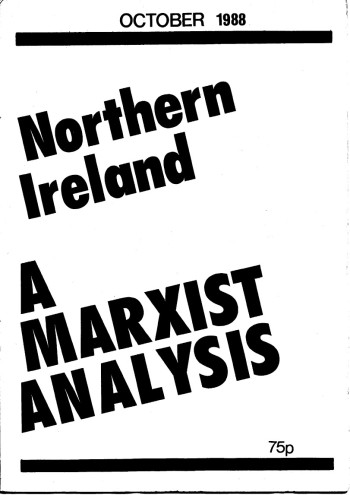
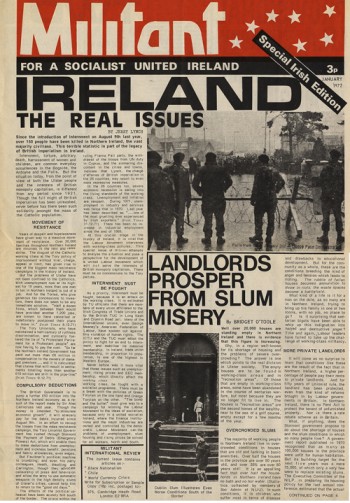
Comments
No Comments yet.
Add a Comment
Comments can be formatted in Markdown format . Use the toolbar to apply the correct syntax to your comment. The basic formats are:
**Bold text**
Bold text
_Italic text_
Italic text
[A link](http://www.example.com)
A link
You can join this discussion on The Cedar Lounge Revolution
By: Dr. X Fri, 17 Dec 2010 09:26:49
In reply to Jim Monaghan.
>>>For a start there was a slogan in one strike in the SAs mines in I think the 20s which was “Workers of teh world unite and keep SA white”.
Which didn’t save them from being bombed from the air by the Royal South African Air Force.
Reply on the CLR
By: Dr. X Fri, 17 Dec 2010 09:42:37
Has anyone been to the 1641 Depositions exhibit in TCD? I didn’t realise that the statements of survivors of the massacres were part of a wider discourse of what I suppose we have to call ‘martyrology’ in the sixteenth century – and that in those days the religious identity was more important than the ethnonational one.
Reply on the CLR
By: Joe Fri, 17 Dec 2010 10:27:11
In reply to sonofstan.
I disagree completely. I met a bloke from the Shankill years ago. We discussed nationality. He said to me that his grandad brought him up to tell the truth. So whenever he was asked what his nationality was he answered “British”. He knows.
I’m Irish. I know. But a study of the genetic make-up of the indigenous peoples of Britain and Ireland has found that there’s little or nothing to distinguish any of them from the rest.
Tell me I’m British or tell that bloke from the Shankill that he’s not and you’ll get the same thing from each of us – an objective box in the mouth.
Reply on the CLR
By: sonofstan Fri, 17 Dec 2010 11:53:00
In reply to Joe.
Well yes and no…
Obviously, as you say, and I agree, national identity is 90+% a matter of ‘being able to say who you are’ – I’m Irish, and in this regard I’m fairly certain I will remain so, but I would, as I think would a fairly large proportion of Irish people, be entitled to a British passport, if I so desired. The point is, there is, often, some element of choice, tempered by circumstance here.
But now take another ‘marker’ of identity – religion. I was baptised, communed and confirmed, and as far as the RCC is concerned, I’m probably a catholic, but as far as I’m concerned I’m certainly not, and I would fight to the last ditch any attempt to include me. Still, though, what I know of religion and religious thought is certainly based on that upbringing, and the ability of the catholic church to annoy me more than anyone else probably attests to the fact that in some highly mediated way, catholicism is still part of my identity.
But my core point above was that the idea of ‘ethnic’ identity brings a whole new discourse of exclusion and privilege with it, and this is why I don’t like people using the idea of ‘ethnic’ identity when they simply mean national identity, which works the way you say.
It would be possible for me – as it is for your friend in Belfast – to pass as British: people might notice the accent, and so on, but I could explain that I grew up in Ireland and so on, but that I’d always considered myself ‘British’ – I might or might not get away with it in all circumstances, but its not absurd to imagine. And similarly, immigrants – and their offspring – to the UK from, Asia and the Caribbean can ‘decide’ to be British, and while Tory backwoodsmen and racists might dispute their right to it, it’s generally acceptable as a self- ascriptive property.
Now try being black in the US or SA (or the UK) and ‘pass’ as white….that’s a whole different level of exclusion and level of determinate identity formation. Which is why I would reserve the term ‘ethnic’ for political and social exclusions and conflicts and identity formation based on the kind of membranes that are not so easily traversed or negotiated.
Reply on the CLR
By: Joe Fri, 17 Dec 2010 12:46:30
In reply to Joe.
Cheers SoS. Yes, it is complicated and maybe I elided ethnic and national.
Funnily enough, the chap I mentioned from the Shankill – I worked with him in Holland during a student summer about 30 years ago. Another chap in the factory was from Dublin, a very plummy Protestant going to Trinity. We all got on and the Belfast lad was fascinated – “I knew there were Protestants in the south but I never thought I’d meet one”. The funny thing was yer man from Belfast used to get hassled by the English police at airports etc whereas the lad from Dublin would sail through as the police recognised a member of the ruling class when they heard one.
Reply on the CLR
By: Starkadder Sat, 18 Dec 2010 00:17:16
On the subject of the proposed Ulster Trade Union
Congress, I believe this idea was later raised during the 1977 United Unionist Action Council
(which the B&ICO also supported, if memory serves
me right).
Ian Adamson discussed the UTUC idea briefly in his 1987 book “The identity of Ulster”.
Reply on the CLR
By: Discounts Mon, 16 Jul 2012 23:52:06
Wonderful work! This is the type of info that are supposed to be shared across the net. Shame on the seek engines for not positioning this submit higher! Come on over and talk over with my website . Thank you =)
Reply on the CLR